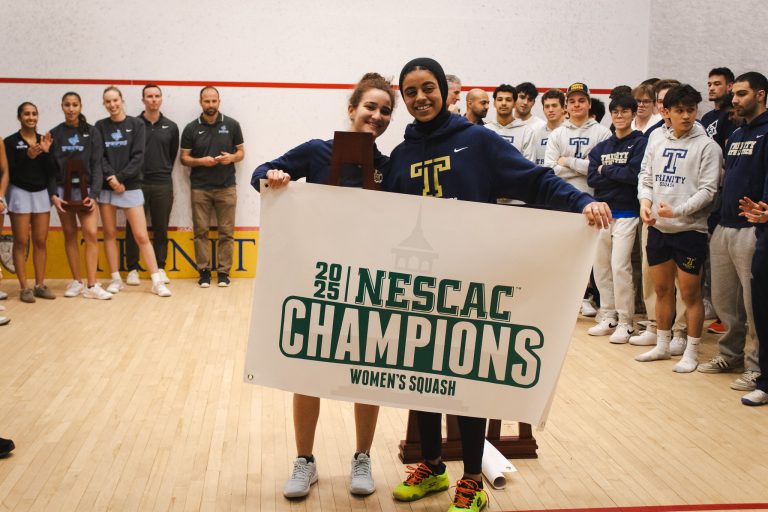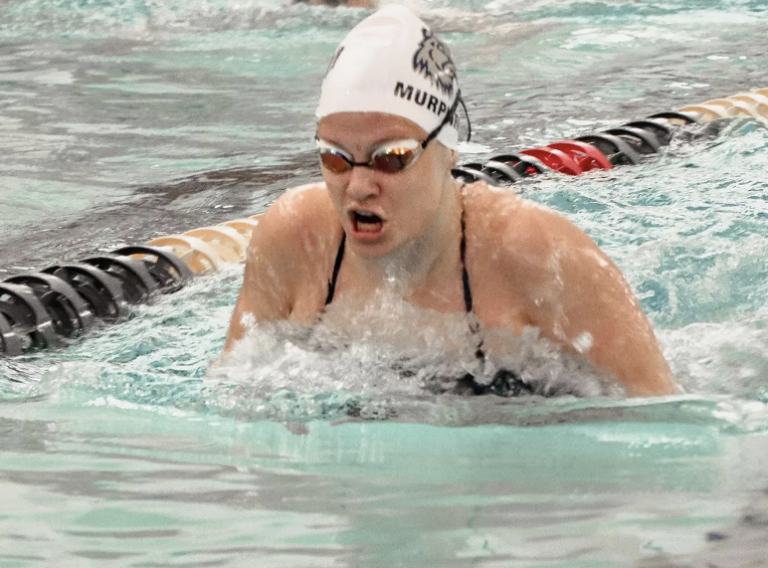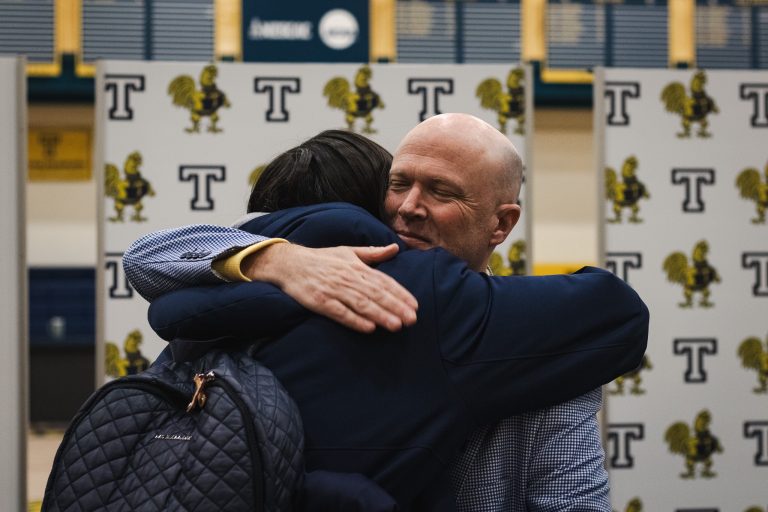By Annika Dyczkowski ’25
Sports Editor
In anticipation for their double header and inclusion game this weekend against Colby College, the Tripod had the opportunity to discuss pride at Trinity and the understated significance of inclusion games with softball team members Abby Alper ’26, Annika Haley ’26, Hannah Mullaney ’25, and Erin Steed ’25. The players begin by walking through their inclusion game last year, and the routine they anticipate following for this year.
Mullaney, an outfielder and catcher for the Bantams, opens the conversation. “Most times we all wear a rainbow bow in our hair or on our cleats, and we’ll warm up in our pride shirts from the athletic department. Before the national anthem, there’s a brief script about why we’re having a pride game and what it means. There’s also QR codes posted to donate to different resources.”
While a script is read, t-shirts are worn, and a pride flag is displayed, it can be easy to brush these actions off as formalities and misinterpret the true importance of pride games. Steed, an outfielder, elaborates on this belief below surface level, and what pride games mean to her. “It’s a showing of our team’s support, like putting things on our field and then also like, saying the script, just showing that we stand behind everybody.” Alper, also an outfielder, adds on, “I think it shows that our team supports through representing the rest of Trinity Athletics. It’s an open space, whether you’re part of the [LGBTQ+] community or not, and anyone can feel free to come watch.” Mullaney concludes with an important observation, “Athletics has a reputation of being really exclusive. And, you know, people think maybe there’s certain types of people who are athletes but holding a pride game is a good way to connect with a greater campus community.” She continues, “There [are] certain stereotypes about how athletes behave or treat other people and we hope to disprove those.”
All of the players agree that inclusion games are a good way of connecting with LGBTQ+ identifying students, and they all share that there was a lack of connection prior to playing at Trinity. Alper recalled, “the athletics department [at my high school] never really did anything for supporting the pride community or anything like that. That was kind of all separated. Athletes never really stepped up.” Steed added on, “The only thing we ever did was Breast Cancer Awareness Month, and I don’t even think there was ever any talk about pride or inclusion whatsoever. There was this big division, I feel like, within the school.” Haley jumped in, an outfielder from Marblehead, MA, comparing her high school experience to Trinity. “Yeah, I didn’t have anything either in high school. It’s so different here, and I’ve noticed that there’s a lot more awareness around it. I think it’s a really good thing and I hope that we can make the LGBT community feel more included at Trinity and more supported by athletes because, as [Mullaney] said, there’s a divide a lot of times between athletes and people who don’t play sports.”
Although they agree that the athletic department does work behind the scenes to make these games inclusive, all of the players acknowledge that there is still a gap between purpose and conventionality. Mullaney explains, “I think for the past two pride games that we’ve experienced, it’s kind of felt like this is a thing that the athletics department is labeling our game versus our coach or one of the ADs coming in and explaining to us, ‘here’s why you’re having a pride game’ and educating us about everything around it, versus just showing up in a different shirt.” Steed shared a similar sentiment, “I’m coming from high school not having this. I do think that the school is doing a really good job, but I think that they can do better. Maybe inviting all of the athletes and having a big assembly on why we’re doing it.” She continued with an observation of other teams on campus, “Also making sure that every single team is doing it, because there are teams that are not doing it yet.” She concluded, “If certain teams are not doing it, it’s still proving the point that pride is not accepted everywhere.”
The baseball team, while the male counterpart of the softball team, does not have an inclusion game on their schedule. “They have a veteran appreciation game, and it’s obviously important to raise awareness for that as well, but it does feel a little bit weird that certain teams pick and choose. You know, if inclusion is a goal of the athletic department, then it should be enforced,” stated Mullaney. Steed agreed, stating “I believe it creates a stigma even more because then they’re like, ‘oh, of course softball is doing a pride game.’ If every team bought in and hosted a pride game, it would be so much more normalized.” Haley agreed, contending “ I think it further proves a difference between men’s and women’s sports. I feel like there’s a stigma around men supporting pride versus women. I think it would mean a lot more if all men’s teams did a pride game because I think it would mean a lot for the LGBT community to see all sports doing it, not just women’s sports.”
When asked about how a pride game hosted by the men’s teams on campus would be received, Haley stated, “I think it would be a really good step.” Steed added on, “Within time it would be accepted and then promoted further, and it just takes that first step of actually doing it.”
The players concluded with solutions to further promote and incentivize inclusion games on campus. They all agreed that social media advertising for pride games could be improved, and Mullaney elaborated on this belief, saying, “Not just posting that there’s a game today, but sharing places you can donate and the things you can do to help.” Mullaney delineated, “I feel like it would be cool if there was some sort of incentive for teams to raise money during inclusion games. Like, let’s say, ‘here’s a weekend that a bunch of home teams are going to have their pride games and where they’re donating to, let’s have a competition to see which team can raise the most money.’ I think that could be a really cool way to incentivize.”
The softball inclusion game is this Saturday, April 20. Show up in your inclusion shirts and other pride attire to cheer on your Bantams in their double header against Colby!







+ There are no comments
Add yours